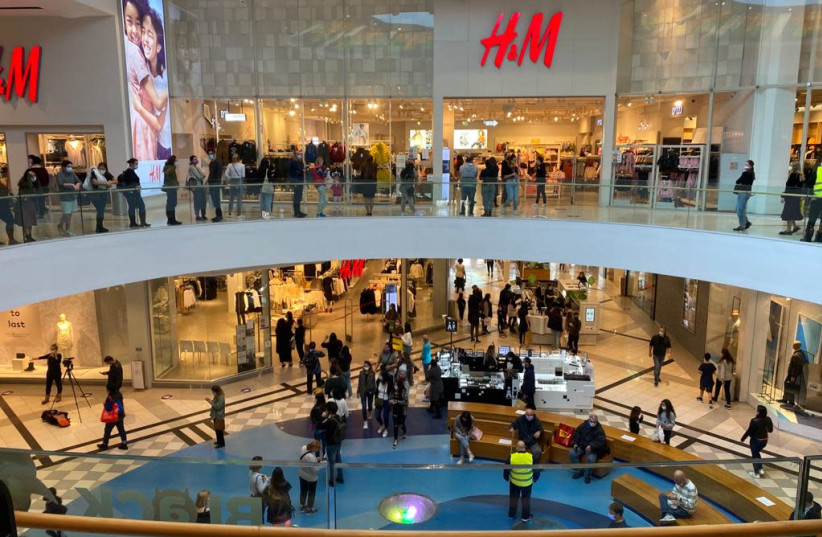Growing up in a middle-class home in Middle America, there were certain things that I thought that everybody had.
A dishwasher, for instance. A garbage disposal. A dryer. Two cars. A basketball hoop in the driveway. A driveway. A walk-in closet in the master bedroom. Two or more televisions. An electric can opener. Even an electric knife.
These were staples in the homes of all my friends, and just seemed basic to modern living.
Until I moved to Israel nearly four decades ago.
In the early 1980s, only hotels here had dishwashers; the sun dried the clothes; only the super-wealthy in Savyon had walk-in closets; and there wasn’t much entertaining fare to watch on one television, let alone on two.

Yet everybody managed.
At first I was flummoxed. Life without a dishwasher – how could that be? One car per family – how do folks manage? No walk-in closet – where do people put all their stuff?
“Don’t worry,” I was assured. “You’ll get used to it. You’ll also learn to manage.”
As I did.
I learned how to scrub dishes by hand; how to dump food scraps into the trash can and not down the sink to be pulverized by a garbage disposal; how to open tin cans manually. I also learned that one doesn’t have to eat in a restaurant once a week. Things that I thought were indispensable, were – alas – very dispensable after all.
Living without the creature comforts I grew up with, I fashioned myself a veritable Henry David Thoreau living the simple life in a Jewish Walden Pond. I was charmed by what I thought was the country’s refreshing lack of materialism, and proud of my ability to “rough it.”
BUT THAT was all before Black Friday.
Turn on the radio, open up the newspapers, and all you hear these days are advertisements for Black Friday sales. But go into any random Israeli store offering one of these sales, ask what gives, why in the world there are sales on the Friday after the fourth Thursday in November – Black Friday – and chances are the salespeople will have no clue.
Why? Because Black Friday fits into Israel about as much as Cinco de Mayo, Juneteenth or even Thanksgiving, the American holiday to which Black Friday is connected. There is no connection. It’s not indigenous to these parts.
These are days that mark events meaningful to other peoples, in other lands, in other cultures. Not here.
Black Friday in America is the day after Thanksgiving, marking the start of the American shopping season that extends from Thanksgiving to Christmas. Urban legend has it that the name has to do with shop owners who – because millions of Americans begin their Christmas shopping on this day – go from the red, or operating at a loss, to finally showing a profit, or being in the black.
But what does that have to do with Shekem Electric, Mahsanei Hashmal or Hamashbir Lazarchan? Black Friday in Israel makes about as much sense as the Piggly Wiggly, a supermarket chain in the American South, slashing its prices before Passover because Israeli Jews do a tremendous amount of food shopping a week before that holiday.
The introduction and spread of Black Friday in this country pounded into me the realization that the lack of materialism and runaway consumerism I encountered and found so refreshing when I first arrived here wasn’t ideological at all. Rather, it was born of circumstance.
Israelis lived without some of the basic possessions I grew up with not because they eschewed materialism, nor because they wanted a simpler life, but, rather, because these possessions were not readily available here, or people couldn’t afford them. Or both.
But once Israel moved from being a developing country to a developed one, with a GNP greater than most states in Europe; once people had the wherewithal to buy dishwashers and large two-door refrigerators with ice makers, they pounced with a vengeance.
And that left me in a bit of a quandary. I grew up with many of these material comforts, then came here and learned to live without them. But now that they have become readily available here, I’m asking myself: Do I need them or want them back?
My answer: Heck yeah. What am I, a frier (sucker)? Steer me to a Black Friday sale. Walden Pond is full of mosquitoes.
Not so fast.
“HONEY, I think it’s time we get a dishwasher,” I suggested the other day to The Wife, water dripping down my arm from lifting wet dishes and placing them on the dish rack above the sink to dry. I’ve been doing this for more than 35 years, and still haven’t figured out how to perform this trick and not get wet.
“We don’t need it,” she said.
“I know, Honey, but it’s not your arm being constantly dripped upon. We don’t need a lot of things. We don’t really need a coffee-bean grinder. But we have one of those. Think of the convenience.”
“This is different,” she said. “I know what’ll happen. We’ll get a dishwasher, and you’ll never empty it. You’ll keep the dishes in there for days. It’ll be more cupboard than dishwasher, and will just become a source of friction.”
In other words, The Wife’s opposition to equipping our home with all the amenities we enjoyed in the Old Country is – like the spartan life lived by so many when I first arrived here – not wholly noble nor ideologically motivated. True, she has never placed a premium on accumulating possessions. But in this case she was not solely guided by Thoreau’s exhortation to “simplify, simplify, simplify,” nor by Hillel’s dictum, “increase possessions, increase worry.”
Rather, she came up with her own injunction: “Add a dishwasher, add contention.” And who needs that – even if we could buy one really cheap on Black Friday?
